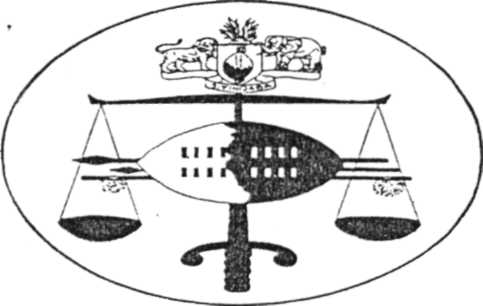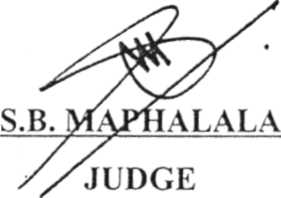1
THE HIGH COURT OF SWAZILAND TIMOTHY MAVIMBELA Applicant And CUTHBERT FAKUDZE Respondent Civil Case No. 736/2003
Coram For the Applicant For the Respondent S.B. MAPHALALA - J MR. M. SIMELANE MR. S. KUBHEKA
JUDGMENT (07/05/2004) This is an application which has been brought by way of urgency. The Applicant has sought relief on motion for an order in the following terms: Dispensing with the usual forms and procedures relating to the institution of proceedings and allowing this matter to be heard as a matter of urgency. Ordering that a rule nisi do hereby issue calling upon the Respondent to appear and show cause, if any to this Honourable Court at a time and date to be determined by
the above Honourable Court why an order in the following terms should not be made final. 2.1 Directing the Respondent to deliver to the Applicant the motor vehicle Mazda LDV Registered SD 251 FS Engine No. F2~24535 2.2 Authorising the Deputy Sheriff to attach, remove and restore to the Directing that the rule nisi referred to in paragraph 2 above operate with immediate effect pending the outcome of these proceedings. Directing that Respondents pay the costs of these proceedings on an attorney and own client scale. Directing that the order together with the notice of motion affidavit and annexures be served on the Respondent. Granting the Applicant such further and/or alternative relief as the above Honourable Court seem meet. The founding affidavit of the Applicant is filed thereto. A number of annexures are also filed in support. The Respondent opposes the application as shown in the answering affidavit of the Respondent. The Applicant avers in his founding affidavit that during the year 2000, he bought the vehicle which is the subject matter of this application from Carters Mall in Mbabane for a sum of E20, 000-00. When the sale was concluded, the seller Carters Mall was represented by a certain Dion Wade. It appears that the Applicant had moved a similar application under Case No. 3181/2002, involving the same parties. The matter was before the former Chief Justice who dismissed the application on the basis that there was a dispute of fact as to whether the Applicant was indeed the rightful owner as the Respondent had alleged that the vehicle belonged to the company, Professional Pumps and Irrigation Technology (Pty) Ltd.
described as follows:
Applicant the motor vehicle described in 2.1 above, currently in the
possession of the Respondent.
The Applicant avers in paragraph 6 that it was stated in his previous application that it escaped both his attention and that of the seller to have the change of ownership documents signed as envisaged by Section 23 of the Registration of Motor Vehicle Act. That which the Chief Justice complained about, has been attended to and has filed annexure "TM1" a document lodged with the registry authority to effect the change of ownership. In paragraphs 8, 9, 10, 11 the Applicant outlines the brief background of the matter. He avers that he is the majority shareholder and the Managing Director of the company and that the said motor vehicle came to the possession of the Respondent whilst he was an employee of the company. The Applicant had bought the vehicle in his personal capacity and this motor vehicle was for all intents and purposes his personal property. As the business demands increased he bought the vehicle to be used by the company for the timely delivery of customers orders. On or about 18th October 2002, the Respondent when assigned to do certain work and when asked to leave the vehicle behind refused to do so. The vehicle is still in the possession of the Respondent though he is now employed at Turns General Suppliers and has been removed from being a Director of the company by the members acting in terms of Clause 75 (c) of the Articles of Association of the Company. The Respondent's reasons for refusing to return the vehicle are basically that he wants the remaining Directors to buy him out. At one point he fixed the sum of E50, 000-00. The Respondent argues that he is a Director and Shareholder of the company. However, according to the Applicant the Respondent was only a Director prior to him being removed. Therefore he is not entitled to decide unilaterally which assets of the company he is going to appropriate. In paragraphs 13, 14, 15, 16, 17, 18, 19 and 20 of the founding affidavit averments on the question of urgency are made. The Respondent as pointed out earlier has filed an answering affidavit. In the said affidavit two points in limine are raised as follows: " 1. The same cause has already been tried and decided upon by this court under Case No. 3181,2002. The matter is, therefore, res judicata;
2. The Applicant has failed to allege his locus standi to make the application. I therefore, pray that the application, in so far as Applicant is alleged to be the rightful o^Tier, be dismissed with costs on an attorney and own client scale. On the merits the Respondent contends in the main that the Applicant is not the owner of the said vehicle. The former Chief Justice complained that there was no proof that Applicant was the owner of the motor vehicle in issue. Applicant has not regularised ownership of the said vehicle. Annexure "TM1" is inadmissible. When the matter appeared before me on the 18th February 2004, both the points in limine and the merits were argued. Mr. Kubheka for the Respondent commenced arguments. On the issue of res judicata Mr. Kubheka relied heavily on the legal authorities of Hoffmann and Zefferr, The South African Law of Evidence, 4th ED at page 335, Rabie, The Law of South Africa Vol. 9 paragraph 338 and Herbstein & Van Winsen, The Civil Practice of the Supreme Court of South Africa, 4th ED at page 470. These authorities are for the general proposition that res judicata may be raised as a defence to a claim that raises an issue disposed of by a judgment in rem or a judgment in personam delivered in a prior action between the same parties, concerning the same subject matter and founded on the same cause of action. It is contended for the Respondent that in casu the relief sought is similar to the relief sought in Case No. 3181/02 and that it eminated from the same cause of action and that the former Chief Justice gave a final judgment on the matter. On the other hand, it is argued for the Applicant in this regard that it is denied that the same cause of action has been tried and decided upon under Case No. 3181/02 and that the matter is now res judicata. The true position it is contended is that the Chief Justice, as he then was, dismissed the matter on the basis that the Applicant had not sufficiently set out his ownership and therefore the court was not in a position to decide the issue in the absence of such document. The crucial document required by the Chief Justice was the transfer form signed by the seller. Under the present application, Applicant has managed to get the seller to sign the same. For a matter to be res judicata, the court must have decided the same on the merits.
In instant case, so the argument goes, the court dismissed the matter for lack of supporting documents. Beck - Theory and Principles of Pleadings at page 165 states the following: "An action dismissed on exception without enquiring into the facts is therefore no bar to the institution of a fresh action founded on the same facts". The authors Hoffmann and Zeffert at page 344 - 345 also expresses the same principle that a judgment is final if it has determined the substantive rights of the parties even if it can be rescinded or reversed on appeal. It would appear to me in this regard that Mr. Simelane for the Applicant is correct that in the earlier order issued by Sapire CJ (as he then was) the said order did not finally determine the substantive rights of the parties and for that reason the plea of res judicata ought to fail. On the issue of the locus standi of the Applicant it would appear to me that he has established this on the facts of the matter. It appears to me that the Applicant has a better title than the Respondent on the basis of annexure "TM1". The said annexure was a further step to acquire full ownership of the motor vehicle. The Applicant could not complete the full registration process in terms of the Road Traffic Act. The Act requires that the Applicant was to take the vehicle to be examined by the police who would then issue the "police clearance" to finalise the registration of the vehicle in his name. The motor vehicle is in the possession of the Respondent who is refusing with it. The Respondent has not produced contrary evidence to state who then is the owner of the vehicle. The Respondent alleges that he is a shareholder and director of the company. However no such evidence of ownership of the company has been produced by the Respondent. In fact, in casu, the company has resolved that it will not contest the issue involving two parties, as it does not own the vehicle in question. This is reflected in the minutes of the Board of Directors of the 12th November 2002 at Matsapha where in item 1.1 the following appears:
- "The Directors agreed and hereby resolved that the company should-not apply ro either intervene or be joined as an interested party in the matter involving Mr. Timothy Mavimbela and Cuthbert Fakudze pending at the High Court. The Directors having satisfied themselves with the help of Mr. Ntshalintshali that the company does not own the vehicle, described as follows; Mazda LDV registered SD 215 FS...". Therefore, the allegation by the Respondent that the Applicant is appropriating assets of the company cannot stand on the face of the above-cited resolution from the members of the company. In sum, I find that on the basis of the evidence before me that the Applicant is the owner of the vehicle, which ownership he acquired when the vehicle was delivered to him. Acquiring ownership of a vehicle is not per se dependent upon the formality of signing the transfer forms, those are merely required for registration purposes. In the result, an order is granted in terms of prayer 2.2 of the Notice of Motion and Respondent to pay costs on the ordinary scale.

2.